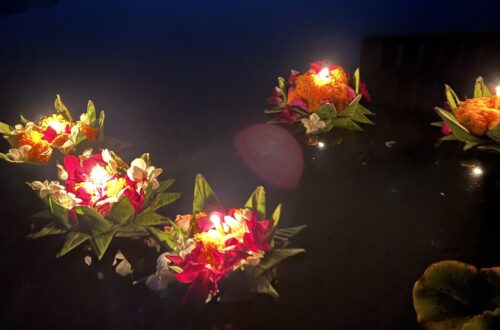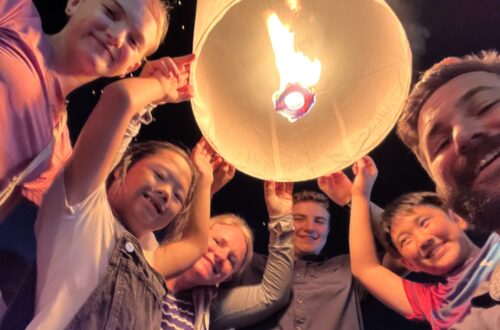
Learning Thai
- Learning Thai - December 4, 2024
- Loi Grathong - November 17, 2024
- My First Outreach - August 1, 2024
As you probably know, our family lives in Thailand. You also probably know that, in Thailand, they speak Thai, not English. While kids are taught English in schools here, and there are several translators living here, 98% of the population knows either no English or only enough to sell you their product. Understandably, us few foreigners here should learn their language instead of expecting them to speak our language. So, that is what we have been doing, even before moving here; Learning Thai.
For a few months before we moved to Thailand, we were learning how to read and write Thai while also trying to learn the vocabulary. Using an online course, we actually got pretty good with reading and writing. However, our vocabulary was not there. The only words I could remember, were the words that are actually English words said in a Thai accent like สลัด (Sa-lad) and ชีส (Cheee-s).
We moved to Thailand only knowing how to read pretty well (although not fluently) and only knowing “Hello,” “Thank you,” and “Goodbye” (which happens to be the same word as “Hello”). Obviously, we weren’t going to get around as well as we wanted only knowing one word. Therefore, we started studying Thai at Lanna Language School. Within a few weeks of 2-hour classes on Mondays, we were already learning a lot more than we ever could have with online courses. Our teacher at Lanna, Khruu (Teacher) Lukmii, was very surprised that we could read and write Thai, yet knew no words. Usually when learning a new language, teachers prefer to teach vocab before trying to teach grammar rules and how to write. However, she soon got used to spelling words in Thai for us and said we had the best pronunciation of any of her students.
Instead of online courses, we were now learning Thai from a native Thai speaker. Our Thai improved immensely and were soon able to order food and buy groceries confidently in Thai. As great as that was, we didn’t think we were learning Thai the best we could, and needed more help. Additionally, Lanna Language School was 45 minutes to over an hour away from our home (depending on traffic)! Lanna Language School is located in หางดง (Hang Dong) district. Our family, however, lives in ดอยสะเก็ด (Doi Saket) district. That made it about 45min-1hour trip just to get there, and then we would eat because our class was in the late afternoon, and then come back home when it started to get dark. That made some days nearly 5 hours for Thai class. It was such a time commitment and challenge living so far away, especially because we needed to move to a new house which was an additional 20 minutes farther from หางดง (Hang Dong). Plus, my parents, who attended separate Thai classes, wanted more classes per week and the thought of making the commute to Lanna Language School more than once a week was insanity.
Our good friends, Lori and Simpson Tsang, (other ZOE missionaries) recommended their teacher ครู เอ็ม (Khruu Em) to my parents. Lori and Simpson both speak great Thai and they lived in ฟลอร่าวิลล์ (Floraville) our old neighborhood. ครู เอ็ม (Khruu Em) taught from her house which was only 20 minutes from our house. So, my mom and dad started going to her classes in addition to Lanna. They loved it. They both got noticeably better and more confident in their Thai, and they enjoyed the much shorter commute. Us kids only met ครู เอ็ม (Khruu Em) once when she taught us how to make Grathongs (don’t know how to spell that in Thai), but our parents wanted to see if we would like her and consider changing classes. We had the chance to do that when Lori and Simpson went to America for a few weeks to raise support and visit friends and family. Since Lori didn’t want to stop paying ครู เอ็ม (Khruu Em) for a few months, she and ครู เอ็ม (Khruu Em) offered for Selah, Jeremiah, and I to take over the classes and see how we liked learning with ครู เอ็ม (Khruu Em). It was really nice and generous from both of them because Lori payed for all the classes and ครู เอ็ม (Khruu Em) kept it at the price of teaching one person instead of three.
In addition to going to Lanna every Monday, we started taking lessons with ครู เอ็ม (Khruu Em) on วันอังคาร (Tuesday) and วันพฤหัสบดี (Thursday), for around 6 weeks. We loved it. One thing about ครู เอ็ม (Khruu Em) that was (and is) very helpful, is the fact she is a Christian, as well as a born and raised Thai person. She knows and understands all the culture and religious practices of the Buddhists, even though she doesn’t practice or worship along side them. When we would learn with Khruu Lukmii, it was different. She was a devout buddhist. She even made sure we knew that the “ghosts” and “spirits” were real. I, as a Christian, do believe in spirits and demons and maybe even ghosts, but I am not going to buy a shrine and cover it in flowers and soda (they really do offer soda and candy to spirits) to ward them off. ครู เอ็ม (Khruu Em) explains the importance of different flowers on shrines and teaches us about Thai holidays such as Songkran and Loi Grathong (click to learn more about). She even told us about certain buddhist monks that practice black magic and sorcery, and how to stay away from them.
After a few weeks, we decided to quit Lanna Language School and go full time at ครู เอ็ม (Khruu Em’s). After a lot of trial and error we now have a weekly schedule. Mom and Dad go for 2-hour classes every Monday and Thrusday afternoons. Selah, Jeremiah, and I, have class every Tuesday afternoon. And then just Selah and I have class on Friday mornings. On Tuesday, we learn vocabulary. And on Friday, Selah and I, improve our reading and writing (which I am really good at). Even though we could read and write pretty well before Thai class, our Friday classes with ครู เอ็ม (Khruu Em) have improved our reading and writing skill exponentially. All the Thai I have scattered throughout this post, I can read in seconds. I am constantly complemented on my speed when reading and my pronunciations are better than most foreigners (including my parents), especially when they are only taught vocab before reading and writing.
Some little things to know about Thai:
Thai is a tonal language, meaning they have different tones which change the word. One good example is with ใกล้ (Glaai) and ไกล (Glaai). ใกล้ (Glaai) is pronounced with a falling tone where your voice starts a little high and the falls in to a lower tone and it means NEAR. ไกล (Glaai) is pronounced in a flat even tone (mid tone) which is how you would basically talk and it means FAR. Yes, ใกล้ (Glaai) and ใกล (Glaai) are complete opposites just because they have different tones. Learning a tonal language has also showed me that English, and every other language is a little tonal too. I mean, to show surprise we take a higher tone of voice. To ask a question, we usually rise the tone, or if answering a question with a question you make your voice fall a little bit. Tones in English can make the same word be either a command, a question, a statement, or an accusation.
Second thing to know about Thai. English has 24 consonants and 5 vowels (6 if you count Y but who does that?). Thai has 44 consonants and 16 vowel symbols which can mix and match to make at least 32 vowel sounds! Every consonant belongs in one of three classes, High Class, Middle Class, and Low Class. The class the letter belongs in will change the tone of tone of the word. Most letters belong in Low class, but there are two letters, อ(Or Aan) and ห(Hor Hiib), that will sometimes be silent and put in-front of words to change the tone of the word. ห (Hor Hiib) is a high class letter that either makes the “h” sound or is silent and changes the word or syllable to High Class which will change the tone of the word. อ (Or Aan) is a middle class letter that is a consonant that is silent and silent to change the word or syllable to middle class which, also, changes the tone of the word. อ can also be considered a vowel and makes a sound which is kinda like “or” but the “r” isn’t pronounced.
Third thing, the way to figure out the tone of a word is the most confusing thing on the planet! ครู เอ็ม (Khruu Em) even says so! Here is what a Thai tone chart looks like;

as you can see, when figuring out the tone of a single syllable you have to take into account, the class of the syllable, the length of the vowel (for most vowels have along version and a short version), whether the ending consonant is soft or hard, and then you have to figure out what it is with the tone mark on top. All of that to find out the tone of a single syllable! And you cannot just ignore the tone because it literally makes the difference between, “I like to ride on my bike,” and “I like to poop on my bike.” I am not kidding. “Poop” and “Ride” are the same word with different tones.
Some other things about Thai is, like how in English we say “please” to be polite, they add คา่ (Ka) if you’re female and ครับ (Krab) if you’re male, to nearly every sentence. I would say it is one of my worst problems when speaking Thai to forget to add ครับ (Krab).
Also, you should rarely trust the transliterations. For example, if you come to visit, you may see the spelling of “Hello” spelled like this

This is incorrect. The Thai word for “Hello” (and goodbye) is สวัสดี and then ครับ (Krab) or คา่ (Ka). สวัสดี should be transliterated like Sa-wat-dee not Sa-was-dee. Here’s why, the letter “ส” makes the “S” sound unless it is at the end of a syllable, then it makes a hard “T” or a “D” sound. However, when amateur translators and/or computers translate, they just see “ส” and go, “Hey, that makes the ‘S’ sound!” and translate it like so. There are several letters that make different sounds if they are the end of a syllable than when they are at the beginning or middle of the syllable. In fact, that is why were pronouncing Jeremiah’s Thai name wrong his whole life. When he was first adopted, his birth certificate showed his Thai name as ประการ, and they transliterated it, Prakarn. This is totally incorrect. First of all, “ป” (Bpor Bplaa) makes a sound that is in-between a “P” sound and a “B” sound. It is not one or the other. “ป” is not a sound in the English language and does not make the “P” sound. Secondly, in Thai they roll or trill their Rs. Not really a mistake in the translation but it was another way we were mispronouncing his name. Thirdly, the “ก” makes a sound in-between a “G” and a “K” sound. A little more like a G but not a K. Fourthly, “ร” is one of the many letters that make a different sound whether it is at the beginning or end of a syllable. In the beginning or middle of the syllable, it makes the trilled “R” sound. At the end of a syllable, it makes an “N” sound, don’t ask me why. But instead of translating it one way or the other, they just put both sounds it makes. Therefore, it shouldn’t be written or pronounced Prakarn (Pra-car-n) it should be written and pronounced something like BpraGkan (ปรa-กaan).
I could go on and on about other little things in Thai like how if you mix 2 “ร” (which make a trilled R sound), you get (Aan). No idea why. Or I could talk about how ใ and ไ are the exact same, making the “I” sound (as in ice). Or how some vowels go on top of the consonant like อั (ah) or below the consonant like อู (oooh) or to the left of the consonant like เอ (eh or ay) or on the right of the consonant like อา (ahh). I could talk about how the consonants, อ ว ร, can all become vowels. But, I won’t, because that would be too long.
P.S. Here are some very boring videos of us speaking Thai.
*Fun Fact* We made these videos with Khruu Em. She can send them to the government to prove she is teaching us Thai, and we can use them to get school credit for learning a foreign language. But, though Khruu Em is fluent in English, she is not confident in her spelling so we wrote the subtitles for her.*
Yes, I know, my voice is terrible.




